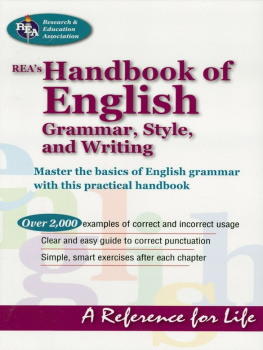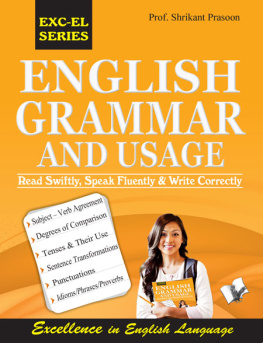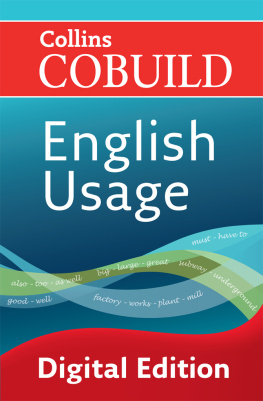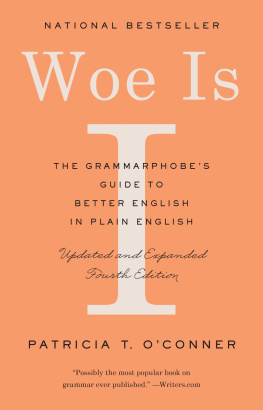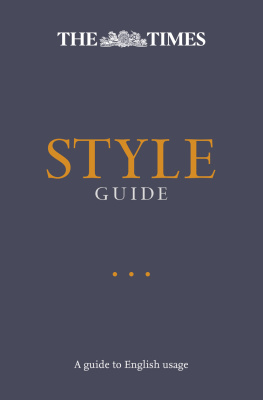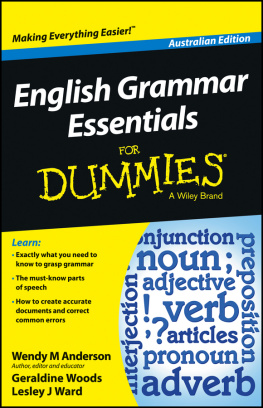One Day in the Life of the English Language
One Day in the Life of the English Language
A Microcosmic Usage Handbook
Frank L. Cioffi
Princeton University Press
Princeton & Oxford
Copyright 2015 by Princeton University Press
Published by Princeton University Press
41 William Street, Princeton, New Jersey 08540
In the United Kingdom: Princeton University Press
6 Oxford Street, Woodstock, Oxfordshire OX20 1TW
press.princeton.edu
All Rights Reserved
Library of Congress Cataloging-in-Publication Data
Cioffi, Frank L., 1951
One day in the life of the English language : a microcosmic usage handbook / Frank L. Cioffi.
p. cm
Includes bibliographical references and index.
ISBN 978-0-691-16507-3 (hardcover : alk. paper) 1. English languageUsageHandbooks, manuals, etc. 2. English languageGrammarHandbooks, manuals, etc. 3. English languageRhetoricHandbooks, manuals, etc. I. Title.
PE1460.C47 2015
428.2dc23
2014024276
British Library Cataloging-in-Publication Data is available
This book has been composed in Sabon Next LT Pro and ITC Franklin Gothic Std
Printed on acid-free paper.
Printed in the United States of America
10 9 8 7 6 5 4 3 2 1
IN MEMORIAM
Frank Salvatore Cioffi
Teacher, Philosopher, Uncle
(19282012)
Contents
Preface
Grammar handbook. The words provoke dismay and revulsion in the hearts of millions. The proverbial ugly duckling of textbooks, the grammar handbook might well be the most dreaded yet least read or consulted book people own.
But this grammar handbook strives to be different. I want you to actually read itand maybe even to enjoy it. Like other handbooks, it outlines, in an abbreviated form, a standard grammar of formal English. At the same time, it argues that learning and using such a grammar actually matters. The books six central chapterscovering the parts of speech, punctuation, and dictionbriefly present various aspects of sentence morphology and syntax: morphology being the forms of words; and syntax, the place or order of words within sentences. (This sounds like technical language, I know. From now on Ill avoid such lingo as much as possible.)
I want to make grammatical issues vital and immediate by debunking some standard rules. Is it acceptable to end a sentence with a preposition? Yes. Is it correct to use split infinitives? To boldly do so is fine. Start a sentence with a conjunction? Sure. How about a plural pronoun used to refer to a singular entity? Not yet, but soon, soon.
At the same time, I want to reinforce some of the precepts of Standard Written English that still count, that make language, and the language-userthe you of this bookmore communicative, more effectual. I argue for an ethics to language use: people consciously use language too often to hide what they really mean, or their slovenly use of it hides or distorts their meaning, or for some reason they are ignored when its vital they be recognized: well, this just mucks things up in general. People get misunderstood, time gets wasted, vital information gets lost. Being more attentive to how we speak, how we write, and how we evaluate others language use will help us gradually create a culture altogether more honest, ethical, and functionalone in which more people will understand what others mean, or at least one in which it becomes common practice to strive to figure out what they mean. In short, we need to up the ante in our use of language. We need to make precision of expression more important and crucial, more of a desideratum than it is right now.
Big goals? Yes. But I believe that usage matters quite a lot. I offer two main reasons it does, and I will invoke these several times. First, poor or incorrect usage often blocks communication. For example, sometimes writing lacks clarity or specificity, its message so muddled as to be incomprehensible. A significant subset of unclear language even inadvertently invokes what I term an absurd universe. This kind of language, which usually contains an ambiguity or an unfortunate phrasing, fails to clearly communicate its message because the reader, attempting to parse the sentence and understand its message, finds him- or herself suddenly thrust into some preposterous alternative universe where things just dont make any sense. This brief, linguistic abduction can be unsettling. The reader soon comes back to our own universe, its true, but with less confidence in the writer or message conveyed. Heres a classic example: With a husband and five children, her washing machine was always running. Is this a universe where washing machines are married with children? Her great loves were cooking her family and her friends is perhaps even worse: the absence of the commas turns an ordinary sentence into one about cannibalism. Of course most readers know soon enough that it isnt really a sentence about cannibalism. But it is for a brief moment, and in that moment, something is lost.
Id also avoid sentences that dont evoke the absurd universe but trick the reader into parsing them in one way and then shift contexts so that the initial parsing doesnt make sense. Termed Garden Path Sentences, these include ones like The old man the boat or The cotton clothing is made from grows in Mississippi (Dalgish, Garden). Expository prose should probably not displace, alienate, or trick its readers, at least not through its sentence construction.
Standard or correct usage also matters because its absence or apparent flouting often stigmatizes the speaker or writer, thus undermining the writers authority or character and diminishing the value of any message. People hear errors or linguistic anomalies and stop listening because they see such imperfect language as indicative of the speakers (or writers) unreliability or unimportance as a thinker or as a narrator of events.
In short, correct usage might not have absolute, eternal truth valueEnglish continuously evolves, and expert opinion about it frequently changesbut even if you are not convinced about the ethics of clear language use, youll probably have to admit that standard usage does have significant practical value insofar as it helps you communicate what you want to communicate.
I try to make this handbook relevant, timely, and maybe less ugly ducklingish by using example sentences drawn directly from already-published material: real-world and actual, these are not merely contrived to illustrate a grammatical precept. I narrow this sampling down to material that was published on a single, typical day (the One Day of my title): December 29, 2008. Using newspapers and magazines with this date, I have culled examples both of misusages and of distinctive, complex, correct language, so that with some three hundred example sentences at its core, the book outlines the fundamentals of the way sentences are put together in English at the same time that it provides examples of common pratfalls and confusions. In addition, perhaps adventitiously, the book offers a linguistic, microcosmic snapshot of a single day all of its readers have lived through.
Throughout, I also discuss many complexities of Standard Written English that are in dispute (e.g., pronoun gender issues, or the aforementioned kinds of dogmatic rules people were taughtmany by the beloved-but-flawed Elements of Style by Strunk and White). In fact, I stress that linguists hotly debate many issues of usage, style, and correctness, and that many of these issues also provoke controversy in a wider public arena. Recently, even Weird Al Yankovic jumped into the fray, with a music video called Word Crimes. It was immediately criticized byand also drew praise froma writer for Slate, and another for the Daily Beast
Next page

